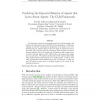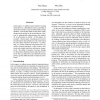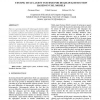132 search results - page 11 / 27 » Adversarial Behavior in Multi-agent Systems |
DARS
2000
Springer
14 years 2 days ago
2000
Springer
In order for robotic systems to be successful in domains with other agents possibly interfering with the accomplishing of goals, the agents must be able to adapt to the opponents&#...
CORR
2000
Springer
13 years 8 months ago
2000
Springer
We describe a framework and equations used to model and predict the behavior of multi-agent systems (MASs) with learning agents. A difference equation is used for calculating the ...
VLDB
2005
ACM
14 years 1 months ago
2005
ACM
In this paper, we address issues related to sharing information in a distributed system consisting of autonomous entities, each of which holds a private database. Semi-honest beha...
KESAMSTA
2010
Springer
14 years 1 months ago
2010
Springer
Abstract. In Multi-Agent System, observing other agents and modelling their behaviour represents an essential task: agents must be able to quickly adapt to the environment and infe...
DMS
2008
13 years 10 months ago
2008
There is a growing demand for Multi-Agent Systems (MAS) in the software industry. The autonomous agent interaction in a dynamic software environment can potentially lead to runtim...



